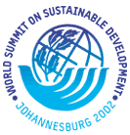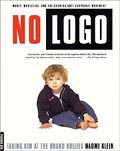Subject:
Naomi Klein, author of No Logo
and anti-globalisation activist.
Do you think the summit can succeed?
In the run-up to Rio, the press were
saying: can Rio save the world? Now the issue is: can the summit save
itself?
Real success is not on the cards Ė
everyone knows that. The US government has made that clear. The
issue is: do we let them cover up their failure?
So do you want the summit to fail?
At Rio, a deal with the devil was
made.
In many ways corporations funded the
summit, but they funded with strings attached. And the strings were,
you canít regulate us, weíre going to have this voluntary
partnership model.
Now, corporate involvement in the summit
has vastly escalated. So success for this summit is failure. When
you have a failed model, its failure is a success.
Is
the United Nations compromised?
Itís a tragic
situation Ė the UN is now acting like the World Trade
Organisation.
They should see
what a bad sign it is to need this level of security at a summit. It
wasn't always the case, but is a result of the merger between the
goals of the United Nations and the goals of the private sector.
Kofi Annan has
convinced himself of the value of partnership. He pioneered the
Global Compact. I canít believed he isnít feeling betrayed by
the companies who posed with him for photo opportunities and have
failed to deliver.
Theyíve used
him and theyíve used the UN.
What do you think about South Africaís
handling of the summit?
Thereís a huge amount of struggle going
on in this country. There are movements exploding. They are
resisting privatisation of water and electricity, resisting
eviction, and demanding land reform. They are reacting against all
the broken promises of the ANC.
This is a security state. It spends three
times as much on private security as it does on affordable housing
Ė just to keep the rich from the poor. This level of inequality is
dangerous.
What weíre
seeing around the summit is an intense version of what is going on
everywhere. Itís taking more and more barriers to keep the haves
from the have-nots.
Why
does the anti-globalisation movement spend more time talking about
corporations than it does governments?
People are
talking about corporations rather than politicians, because their
politicians have been bought.
Thereís no
better example than the United States. Its government represents an
absolute and complete merger between the corporate sector and the
people running the country.
There are a
dozen CEOs who are in the Bush administration. Theyíre shuttling
back and forth between those two worlds Ė and theyíre writing
policy for each other. The idea of a public/private partnership is
Dick Cheney meeting with his old friend Ken Lay, and writing an
energy policy.
I object to the
idea that the nation state is going to stand up to corporations.
Nation states made the deal with business in the first place.
Nothing is going to change until there are radical democratic
reforms in our countries, along with a much deeper understanding of
what democracy is.
So what does this new democratic model look
like?
Across Latin America, thereís a
revolution going on against privatisation. In the US, itís being
covered as a rise in anti-Americanism, but this is a very shallow
appreciation of whatís going.
Now some people think this stuff is just
cute and donít think it offers real solutions. But I believe these
peopleís movements will form the building blocks of a different
kind of globalisation.
People have
always wanted to believe in saviours
- a fiery charismatic leader or another one-size-fits-all
system that will really
work this time. But now people
do not trust anyone but themselves Ė especially young people who
are so suspicious of their leaders.
People
donít want to make the same mistake they made in South Africa,
where you get freedom of the ballot box, but you donít get
economic freedom.
What are your plans for the future?
I am very interested in what is going on in Argentina. Itís in a total collapse and that has
created a power vacuum and an opportunity to try out new ideas.
In the run-up to
the March elections, the social movements, which bought down five
governments in two weeks, are trying to come up with a platform for
what participatory democracy and genuine accountability would look
like on a national scale.
Their
politicians are crooks. The IMF canít help them. And they donít
want to vote for a new saviour. They want to find ways to deeply
change the system. And this means questioning the very idea of
representative democracy.
It a laboratory for democracy.
Iím going to move there for 6 months Ė
because I believe so strongly this is where the next template will
be developed.
25 August 2002 | 
